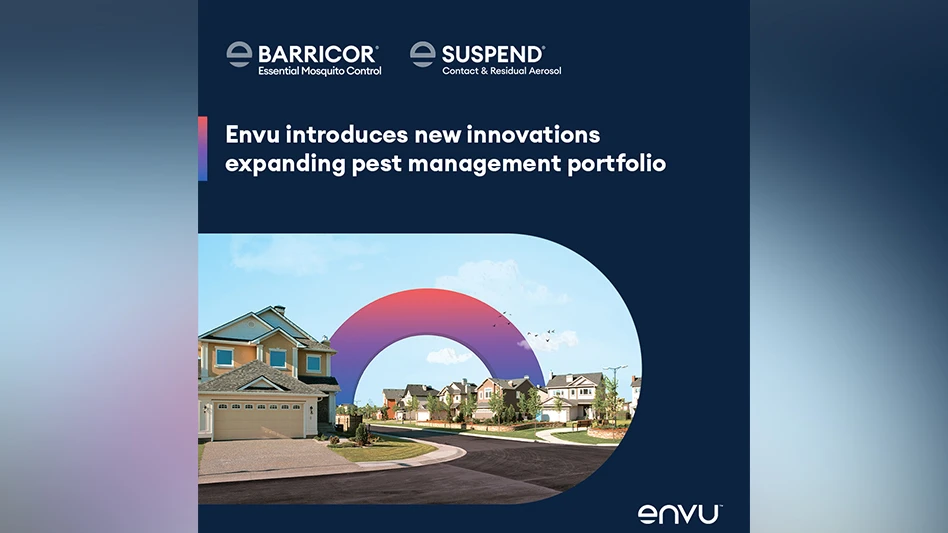Editor's Note: We recently talked with Peter Eldridge, president of Apex Pest Control in Rockledge, Fla., about the rise and fall of the pretreat market in recent years. The company, which has branch offices in Orlando, Tampa, Jacksonville and Miami, has been a major player in the Florida pretreat market for years. As such Eldridge experienced the housing market's precipitous fall firsthand, and successfully steered his company through one of the worst industry nosedives on record. Here's his story, as told to PCT contributor Lisa McKenna.
 Peter Eldridge holds down the fort at Apex’s Rockledge, Fla., headquarters. Peter Eldridge holds down the fort at Apex’s Rockledge, Fla., headquarters. |
Termite control has always been a big part of our business. We began in 1985 marketing ourselves as "Termite Experts." Along with that we also established pest control and lawn routes. We didn't really get into the pretreat business until about 10 years later, but when that segment took off it became a huge part of our business. The beginning of the residential building boom for us was around 1995 and it was a 10-year run through 2005.
As an example of our growth, in 2002 Apex bought more of a then-popular pretreat termiticide than any other company in Florida. We had 30 $40,000-tanker trucks doing nothing but pretreats. We were just slamming pretreats, some technicians doing 15 per day or more.
Our high point was 2005 — we were doing 6,000 pretreats per month statewide in Florida, which was about 90 percent of our termite business. We were one of a small handful of companies that pretty much controlled the state in terms of pretreat work.
Back in that "heyday," pretreats took precedence over all other work. We had a "two-hour guaranteed response time" for builders. Many times residential lawn customers were pushed aside or rescheduled if the pretreat workload was high. Our company mantra was to deliver superior service to our builders at all costs. Everyone else came second.
Fortunately, I predicted the housing market's collapse a few years before it happened. Around 2002-2003, things reached a sort of fever pitch, and I knew it couldn't continue. The people that were working for the residential builders — such as bookkeepers, the office staff — were flipping homes themselves. It was just nuts. Purchasing agents would come to me and ask me to buy the last 20 lots of a subdivision because they had run out of money. So they were going to subcontractors for money because they were stretched. It was just insane, and I knew nothing like that can go on at that pace forever.
I would preach at management meeting after management meeting, that this housing run is not going to last forever. I knew it could not sustain that level of frenzy. I preached to our managers to build other services. We hired an ad agency (the same one we use today) and advertised our pest and lawn services heavily to the residential market using Yellow Pages, radio, newspaper, TV, etc. We dumped a lot of profits into building our brand for about four years before all hell broke loose.
But in 2006 when the decline started, it really was like someone just turned off the switch. For us the decline wasn't gradual — it just stopped. The phone just stopped ringing. I never expected it to happen like that.
The builders just stopped building and many went bankrupt and never paid us. From our high point to our low point afterwards, we lost 33 percent of our gross revenue. It was like going from crazy to nothing in about six months.
In 2007 things got worse, and in 2008 worse still. The whole country was in the midst of the recession, and we weren't doing any pretreats. At all.
Like many owners of larger companies, I had personally stepped back a little. I had a general manager and wasn't too involved in the day-to-day operations. Things were going great, we were growing like gangbusters, and life was good. That came to an immediate halt and I jumped back into operations with both feet. I believe my employees were actually glad I got re-involved. There is an old Cuban saying that loosely translated goes like this: "The eye of the owner, makes the cow fat." I am a firm believer in this. When an owner becomes too uninvolved, the company is either going to cease to excel, or cease to exist.
 At the time we were spending a fortune on advertising and many other quasi-necessary expenses. I saw that things were coming to a screeching halt in 2006 and immediately stopped all discretionary spending (advertising, association & membership dues, raises & bonuses, travel & entertainment, etc.). I took all of these funds and paid off all vehicle loans and other debt to the point that we didn't owe anybody anything. Over the following years, that actually saved us until we could re-group.
At the time we were spending a fortune on advertising and many other quasi-necessary expenses. I saw that things were coming to a screeching halt in 2006 and immediately stopped all discretionary spending (advertising, association & membership dues, raises & bonuses, travel & entertainment, etc.). I took all of these funds and paid off all vehicle loans and other debt to the point that we didn't owe anybody anything. Over the following years, that actually saved us until we could re-group.
With no debt, our cash flow increased substantially, even with a decrease in revenue. Of course we had to lay off about 30 employees, many of whom were not only dedicated employees but also friends. That was the hardest part. We sold off the trucks we no longer needed — about 25 in all — and kept the best ones as spares. We closed two small branches in Stuart and Fort Myers. Basically we had to become lean and mean.
Adjusting the Apex business model after the loss of so much business required a complete overhaul of our operations, and I am still adjusting it six years later. We didn't exit the pretreat market but we really had to "look for new cheese." If you ever read the book (by Spencer Johnson and Kenneth Blanchard), that was our mission. I actually bought a case of Who Moved My Cheese? books for all of our managers and salespeople and we forged ahead into areas I never dreamed of before. We began performing services that we used to ignore or refer to other companies. Never again did we say "we don't do that." That phrase became a cardinal sin. Bat Exclusion, Bird Control, Bee Control, Restaurant Pest Control, Live Animal Trapping, Weed Control on airport runways, Aquatic Weed Control in lakes and ponds, Termite Fumigations — these are all things we do now that we never did five years ago. Some of them we have become "recognized experts" in by certain municipalities, and they are extremely profitable. We were able to get back into some of the areas that we had exited earlier when we closed the two small branches. We've even expanded into Miami, our first expansion into new territory in eight years.
We thanked God for our pest, lawn and termite warranty customers and drastically increased our level of service. No longer did they take second place. Now they were golden.
Pretreats no longer take priority over other customers, and the builders no longer expect a ridiculous level of service. It used to be that a builder would fire us if a competitor offered a price of 1/4 cent less per square foot. Now there seems to be more loyalty. I think they are just glad that we show up. A lot of the competition is simply gone. These days each one of our branches has one pretreat truck — not 10.
Our pretreat work is growing again. Today 50 percent of our termite business comes from pretreat work, but the market is different these days: There's very little residential building going on. There is some, and we're still involved in that, but it's nothing like it used to be — maybe one job a week. In the old days they would call you and say we've got 12 houses on Acorn Street that are ready for today, and that was every week, for each builder.
We're doing mostly commercial pretreat work now: malls, office buildings, big box stores, sports facilities (the new Marlins baseball stadium in Miami, for example) — some pretty significant commercial jobs. We've been in the commercial pretreat market for about 20 years; it's something we've always done. It slowed down along with the housing market but not to the same degree. But now the pretreat market is not based on residential housing like it used to be. I honestly don't think it'll ever come back like that in my lifetime. That was a bubble that will never happen again.
We've changed our entire business plan, and are more of a general pest control company doing everything now. As an example, pretreat accounts for just 5 percent of our revenue, as opposed to the 45 percent it was back in 2005.
Our business model seems healthier now, and we're a lot more well-rounded. We had too many eggs in one basket before, and were simply trying to keep up with the part of the business that was booming.
Looking back, I shudder to think of how we treated some customers as "second place," and the amount of business we overlooked because we let the good times roll. Today, we work a lot harder for the same profit, but I feel that our company is stronger, and our work is actually more satisfying. It's especially satisfying to know we survived the worst economy since The Great Depression and we came out intact. I have a great industry and great employees to thank for that.

Explore the September 2011 Issue
Check out more from this issue and find your next story to read.
Latest from Pest Control Technology
- How to Get Rid of Odorous House Ants
- Massey Services Promotes Herndon to Director of Sales for Multi-Family Division
- NPMA Announces First Recipients of NPMA PRO Certified Credential
- Pestmaster of the Hudson Valley Acquires Catskill Animal Damage Control
- Photo Slideshow: Ant Identification Tips
- Video: Top 10 PCT Photo Contest Finalists
- UF/IFAS Study Reveals Boats as Perfect Vessels for Global Termite Spread
- Pest Control Consultants (Iowa) Earns Pinnacle Performance Award





